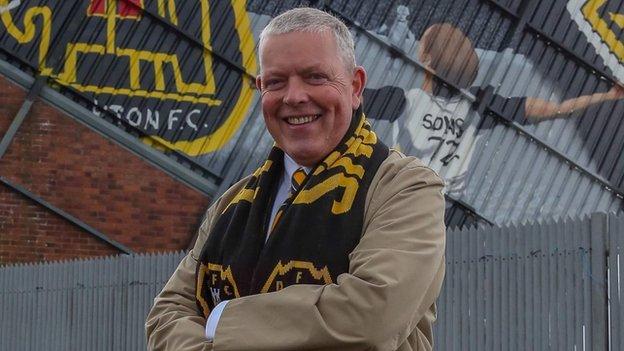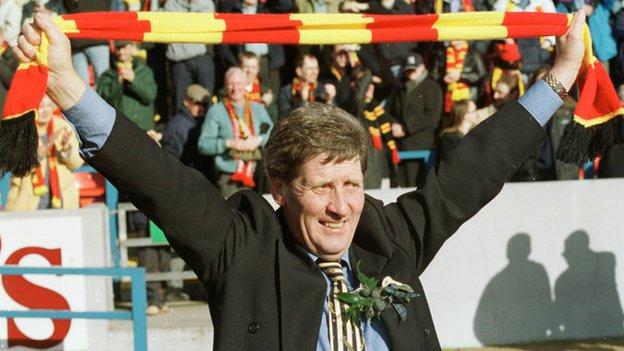
[ad_1]

“If you recognise your player as a physical commodity, that’s probably all you’ll get, but if you recognise they’ve got emotional, mental and spiritual needs, then you might actually get a better player out of it.”
There is an element of the unknown when it comes to the role of a chaplain within football. For those not connected with the daily running of a club, the position may seem a bit alien. However, their role certainly does not lack in importance.
So what exactly does a club chaplain do?
We spoke with Mark Fleming, Director of Sports Chaplaincy Scotland, and Grant Hamilton, now club chaplain at Dumbarton, who told BBC Scotland about their roles and experience in the game.
‘A shoulder to cry on’ & training with the players
Given the religious background most club chaplains come from, it could be natural to assume they only provide support from that angle. However, it is actually much more than that.
Mark Fleming, director of Sports Chaplaincy Scotland, describes the role as “a sounding board, a listening ear or a shoulder to cry on,” and that shoulder can be used not just by club employees, but also by the families connected.
Approaches to the chaplain can relate to issues occurring on the field such as a dip in form and the social media attention that could follow as a result.
Fleming, who took up one of the first roles in Scotland at his beloved Partick Thistle in 1998, recalls the tumultuous period in which he first got involved at the club.
“Thistle were in a lot of financial trouble at the time, so the manager [John Lambie] felt like he was more of a social worker than a football coach,” says Fleming.

“He was finding it hard to get the players focused on the football because of all the financial problems and worries at the club, so they brought me in to be somebody the boys could turn to away from the game.
“They actually got me involved training with the players. I trained with them for nine seasons and I wasn’t the worst either!”
Becoming a chaplain scout
During Fleming’s time at Firhill, players moving on would often say how they could be doing with a chaplain at their new club.
Following this, he introduced the idea to Kilmarnock and St Mirren before gradually getting other clubs onboard, acting almost as a ‘chaplain scout’ as he began to source, train and appoint chaplains across the country.
That included Grant Hamilton, who took up the position at boyhood heroes Queen of the South in 2014 after Fleming asked if he would be interested in coming along to training to have lunch with the squad.
What Hamilton did not realise was the role would be an eye opener in more ways than one on his first day meeting the team.
“Assuming lunch was provided, I didn’t actually bring anything to eat,” says Hamilton. “But I ended up spending my lunchtime watching everyone else eat instead.
“That was my first insight into the fact Championship football might not be so glamorous as I thought.
“Over the years these funny moments are balanced out by encounters with players that are more serious and more difficult to talk about, moments players trust you with things they might not ever tell anyone else. These moments make you feel privileged.”
‘There was no transfer fee involved’
After six years in the role at Queen of the South, Hamilton recently moved to Dumbarton to be closer to home. And although the transfers of playing staff may seem a common occurrence in Scottish football, the same cannot be said for chaplaincy.
“A few people have had a laugh about it,” says Hamilton. “Allan Johnston, the Queens manager, phoned me to say he’d never heard of a chaplain being transferred before.
“But even as a Queen’s supporter, it made sense for me to be involved with a local football club. I am minister of Dumbarton Baptist Church, we are part of the fabric of the community and I was finding it more difficult to travel for training then 100 miles each way for a home game.”
Hamilton is now within walking distance to the stadium he is based at, allowing him to be more involved in the community while spending more time with staff at the club.
And while this has allowed him to provide his utmost support, taking on the role of Child Protection and Well Being Officer, he feels Dumbarton deserve credit for their commitment to chaplaincy.
“Dumbarton signed an agreement with Sports Chaplaincy Scotland that sets out the standards that are expected,” says Hamilton. “This is a great development as it clarifies what is expected of everyone.
“When I started six years ago, I felt like a glorified ball boy who was making it up as I went along, but things have definitely improved and I have learned a lot from those early experiences of trailblazing.”
[ad_2]
Source link